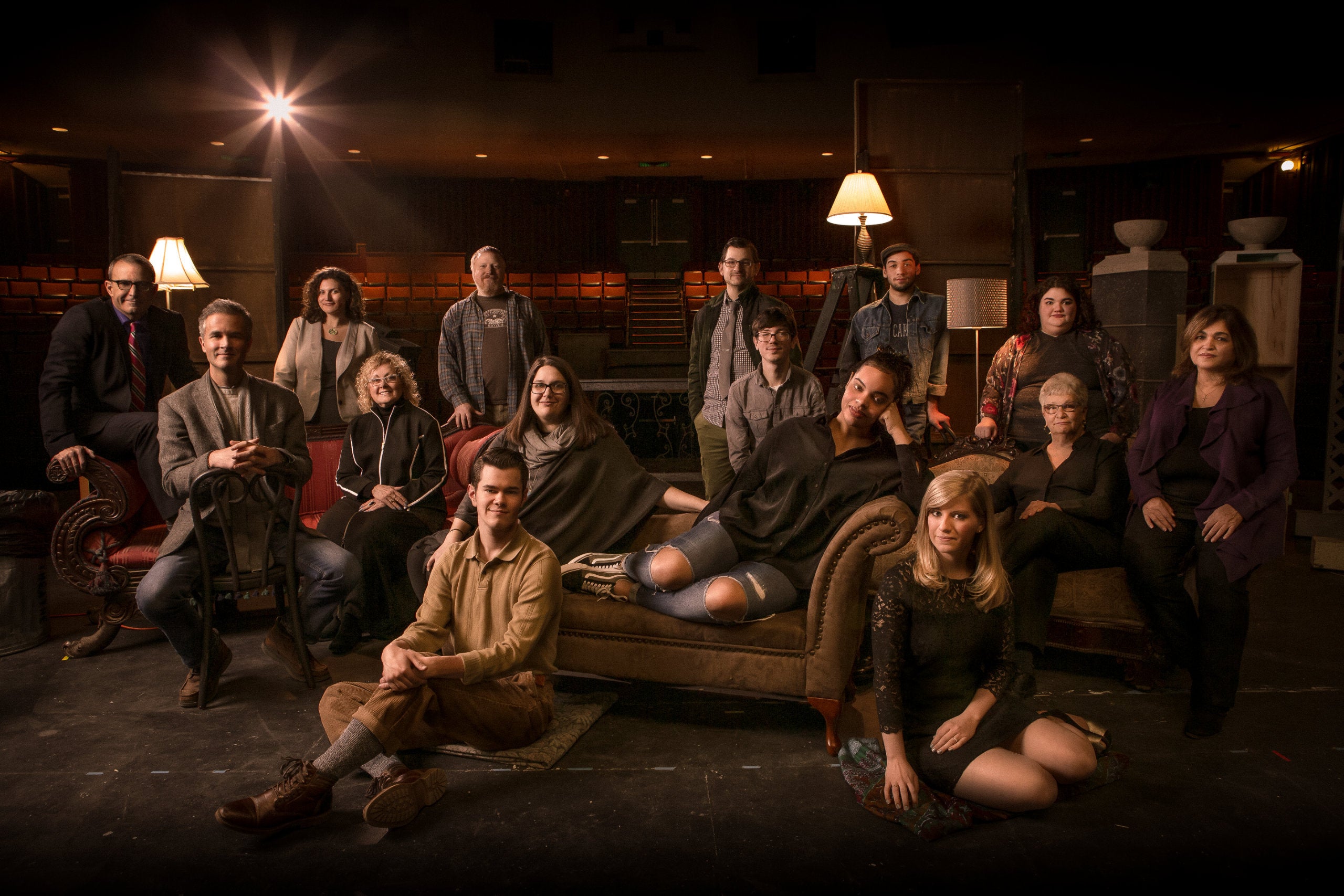
Taking Center Stage

URI Theatre Department faculty and guest artists are innovating the region’s theater scene and providing opportunities for students to practice their craft with the pros. It’s never been a better time to be a theater major.
Finals week: The Theatre Department is buzzing. Students run lines outside of the Robert E. Will Theatre, sing in G Studio, and, in J Studio, double-paddle turn and twist to Hairspray’s “Nicest Kids in Town.” No finals fatigue here; it’s opening-night energy.
With four main stage productions, one student show, and a student project a year, the department’s production schedule is on par with a professional theater’s, says department chair David T. Howard. Without the budget, though. “We’ll do a whole show for around the price of a single costume on Broadway,” Howard notes.
How? Hard work, dedicated faculty, and a group of artists, most URI graduates, recruited both for their skills as educators and their impressive pedigrees.

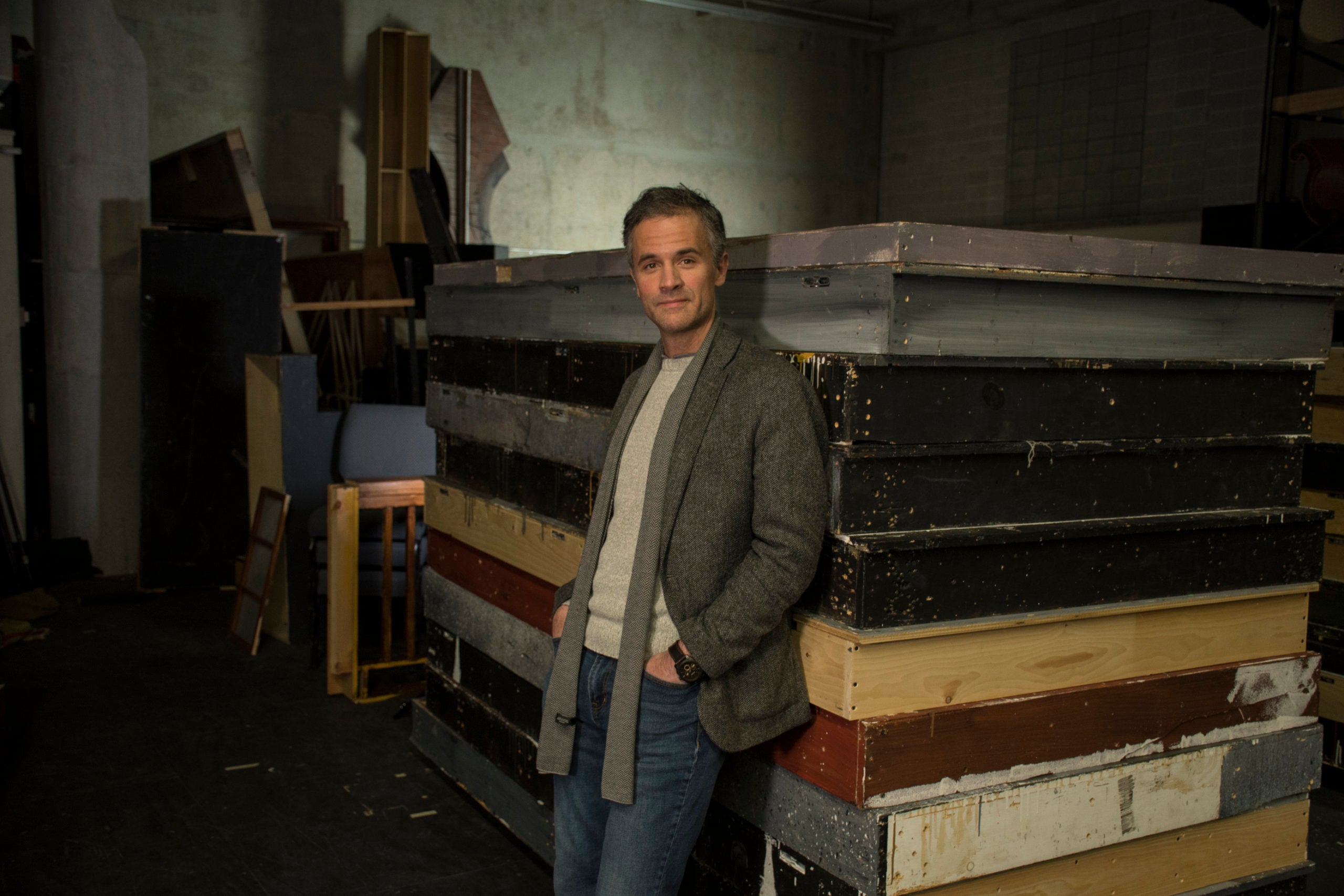
“We’re helping to create people who can deal with adversity, who can work collaboratively, and who can think creatively.”
On a sunny Friday afternoon, David Howard and Tony Estrella chat in Howard’s office about a recent theater graduate working in software systems processing. Inadvertently, their conversation turns to the issue that dogs theatre professionals, their students, and their students’ parents: What’s the ROI on the BFA. “The thing about theater is, you build skills you can use in new ways,” Estrella says. “Theater is an entrée, a foray, into a lot of different worlds. It can lead to a career on Broadway or to project management or even to hosting a game show.”
More on that last one later.
Estrella is in his seventeenth year as artistic director of The GAMM Theatre in Warwick, Rhode Island, and his twenty-first year teaching at URI. He teaches seniors Shakespeare. Students will tell you Estrella’s approach is to treat students as professionals, collaborators engaged in essential work: the exploration of radical, challenging, and even ugly ideas. “An art form needs a place where it’s safe to be unsafe,” Estrella says. “There’s a danger in art. It has the power to unsettle, to provoke, and to entertain, of course.
“Great playwrights are looking at the true complexity of ideas and making them public. Our responsibility is to challenge, provoke, illuminate, and entertain,” Estrella says. “Theatre is an act of citizenship. It is an act of engaging with the community.”
And engaging through teaching, Estrella says, has made him better at his craft. “You learn so much. You have to be honest—interrogating, practicing what you preach, examining, articulating, and making it all plain to students who are not as experienced. It makes you a better actor. No question.”
Estrella’s method for teaching acting is rigorous engagement with the material.
“You’re using the text, the language, doing a deep dive, a close reading. You follow that through and you’re following that with your own experience and what those experiences cost you. It’s not always a direct one-to-one correlation, of course,” Estrella notes. “None of us has died yet but we have to die on stage. You build off what you have.
“After all, what is our job as actors but to walk in each other’s shoes?”
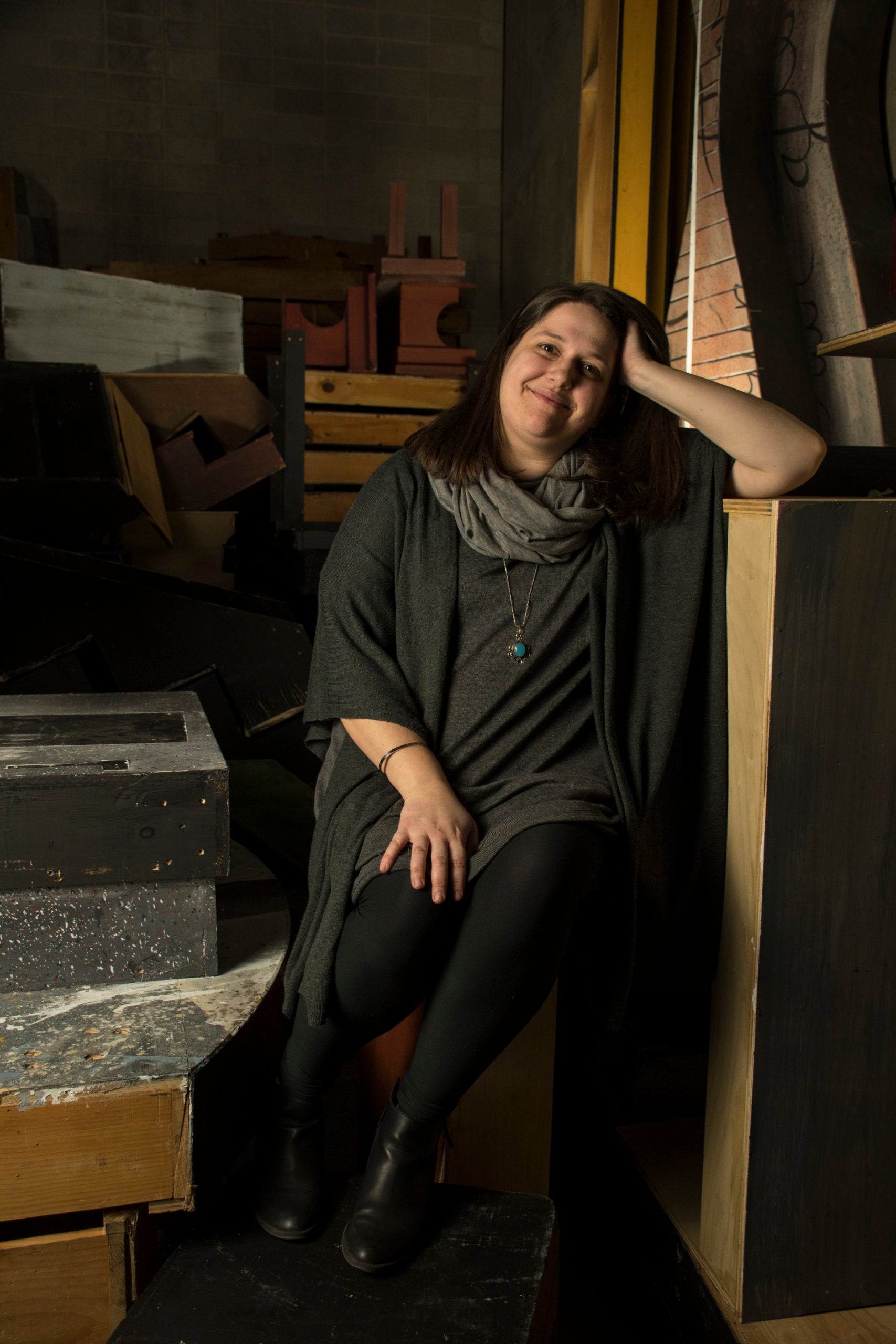
“You’re getting a well-rounded education that prepares you to enter the professional world.”
You will find URI graduates working in almost every theater in the state, from the established—Trinity Repertory Company, Theatre-By-The-Sea, and The GAMM—to up-and-comers such as The Wilbury Group, OUT LOUD Theatre, The Burbage Theatre Company, and The Epic Theatre Company.
One reason URI’s theater graduates are sought after is the nature of the BFA program, which requires concentrated study in acting, design and theatre technology, directing, and stage management. While students specialize in one of the four areas, they must be familiar with all.
It’s an education directors appreciate, says Hawkridge, who directed last fall’s production of Women and War. OUT LOUD’s last ensemble boasted four URI alumni among the eight members. “That’s a testament to how the department creates a community that people like me want to return to,” Hawkridge says. “There’s something about how we were all trained that is special. All students participate in every role at least once: costume shop, box office, design, auditions for shows.”
Students develop an appreciation for one another’s work and have ample opportunities to do the work they want to do. “And jobs lead to other jobs and collaborations are born,” Hawkridge says.
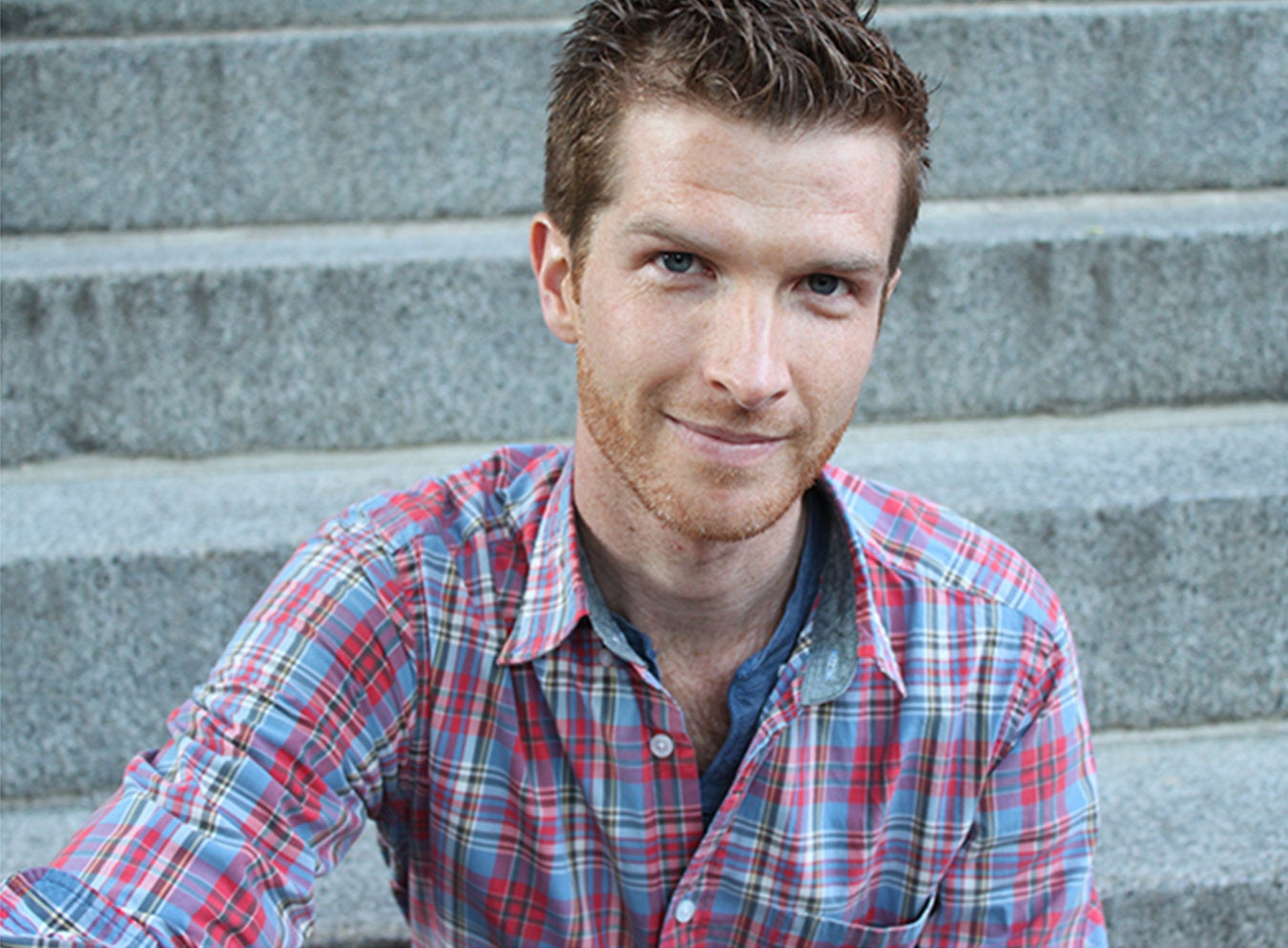
Production manager, Gloucester Stage Co.
Host, High School Quiz Show-Rhode Island
“URI is driving the Rhode Island theatre scene.”
Joe Short teaches presence.
“Voice and body are the two tools of the performer,” he says. Sophomore year is spent talking about how to use those tools through, in part, the study of habits and tendencies. Junior year is the study of rhetoric and pitch, how to format an argument, and how to reflect all with the body. Senior year those skills are further refined.
“We move you through increasingly rigorous training to extract the best actor, director, or production manager,” Short says. “It’s an intensive and personalized journey.”
And the state’s theatres are the beneficiaries. “It’s exciting that there are so many opportunities right now,” Short says. “And more than half of those opportunities being started are being done by our alums.”


New movie: Vault
When students say, ‘What if I go out for it and don’t get it?’ I say, ‘Well, what if you do?’ Go. Try. This is what we do.”
Becoming an actor was an act of rebellion for Eric Lutes. His father wanted him to become a painter but Lutes set his sights on the stage. “Growing up in the home of an artist, my father said, ‘Go, do it,’” Lutes says.
Lutes’ first television show was the NBC juggernaut Frasier, starring former Cheers star Kelsey Grammer. That gig led to a lead role on the NBC sitcom Caroline in the City, which ran for four seasons and was in syndication for 11 years. In his 30+ year career, Lutes estimates he’s been in nearly 200 sitcom episodes in addition to feature film work. This June, he plays a gangster in the film, Vault. Set in the 1970s, the film chronicles a Providence bank heist in which thieves made off with $40 million. Martin Scorsese is one of the film’s backers.
“The main thing I try to instill in students is that you gotta keep showing up. And being on time is a huge thing for me,” Lutes says. “After that, it really is about the work. Do your homework. The only time I was nervous for auditions was when I wasn’t prepared. No one else is going to do it for you.”
And be multifaceted.
“Don’t just be an actor. Have other interests. You bring all that to acting anyway, and there’s so much else to life,” Lutes says.

“Storytelling, creating empathy: it’s a noble thing.”
Two years after graduation, Josh founded The Wilbury Theatre Group in Providence “as a way to act and be in plays more often.” Eight years later, he accepted the 2018 National Theatre Company Award from the American Theatre Wing—the organization behind the Tony Awards. Trinity Repertory Company is the only other Rhode Island theatre to receive recognition by the American Theatre Wing.
“The goal is to become a nationally recognized theater that provides a platform to show new work from diverse voices,” Josh says.
Josh credits URI with hammering home discipline and commitment to the craft. “URI’s theatre students are trained to work hard. They have an understanding of what it takes to be good.”
The Wilbury’s commitment to new work and diverse voices extends to education outreach, youth programs including a “pay-what-you-will” acting class; Camp Shakeweird, a two-week camp for children ages 8 to 11; and the Youth Playmaking Program, an-all-expenses-covered opportunity for teens interested in producing theatre. And through the annual Providence Fringe Festival, The Wilbury Group and other arts organizations draw more than 250 artists from around the world to Providence for a week-long celebration of the arts.
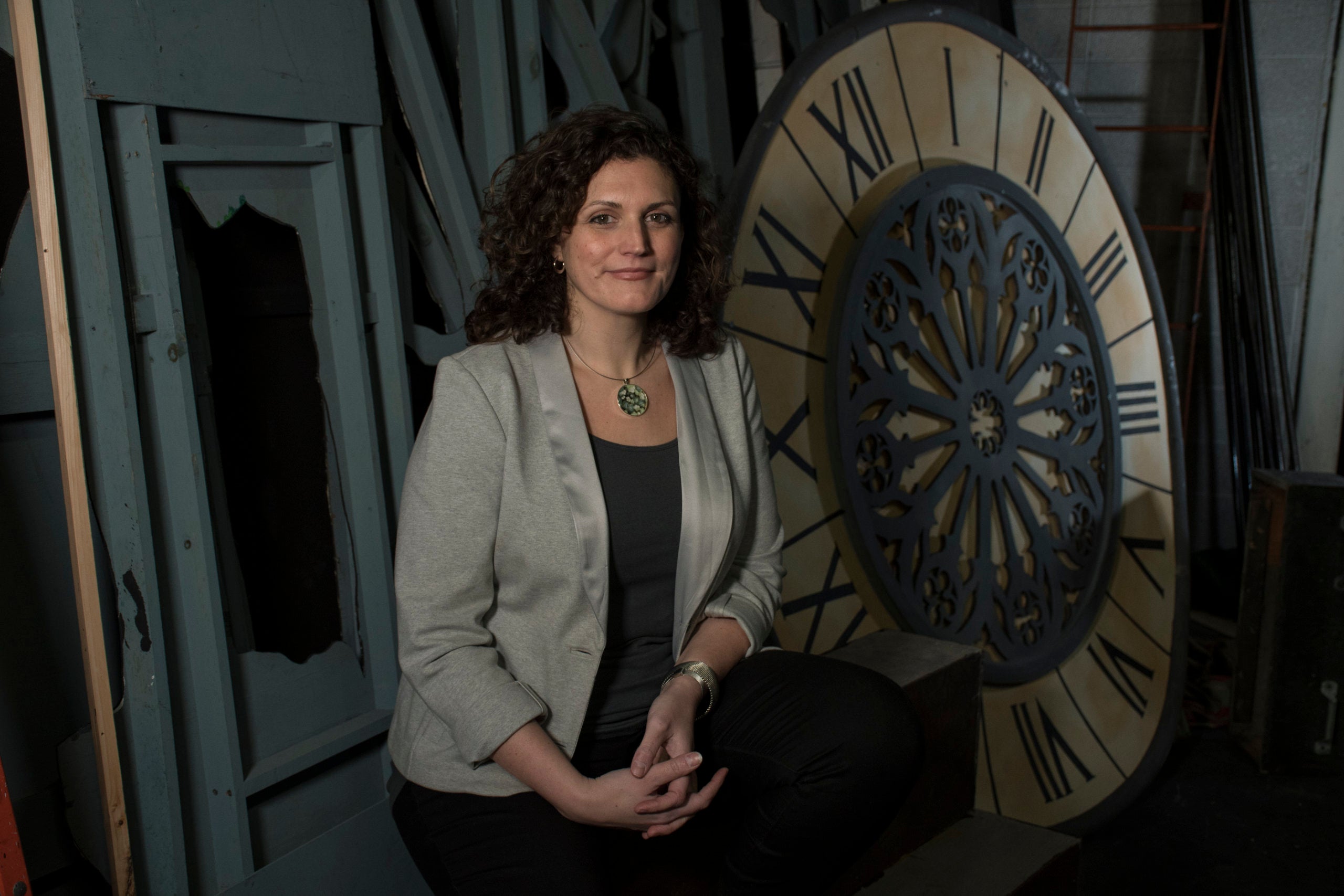
“Art can accommodate complexity, nuance, and ambiguity like little else in the human experience can. It is a practice and a technique I would regard as core to the human experience and necessary to do this thing called life.”
Classes, rehearsals, and soccer practice: These are the things that occupy Rachel Walshe’s mind at the moment. She’s directing Gloria at the GAMM Theatre and casting URI Theatre’s production of The Wolves, a drama about teammates on a high school girls’ soccer team. She’s got the URI Women’s Soccer Team consulting on the play and is arranging for the student actors to attend the team’s 6 a.m. practices.
The University’s sole Rhodes scholar, Walshe always intended to teach at a public institution. “My four years as an undergraduate were transformative. I feel I became me here,” Walshe says. “So, for me, I wanted to work with undergraduates, where teaching matters most.”
“I get to practice what I do all day, every day. I coach actors, I think structurally, I practice practical techniques, and I get hired to direct plays professionally.”
And Walshe’s students get to see the collaboration between Estrella, Short, Howard, et al on a daily basis from the inception to the conclusion of a project. “They’re witnessing discussions with professional artists who are doing this for real, figuring things out in the moment. It’s a tremendous benefit having that kind of contact with your collaborators.”
And what does she hope students take away from the experience?
“I want students to recognize the value of the arts, to recognize that the act of storytelling is as primal as anything else we would consider essential to the human experience,” Walshe says. “We tell each other stories as a survival skill.”
